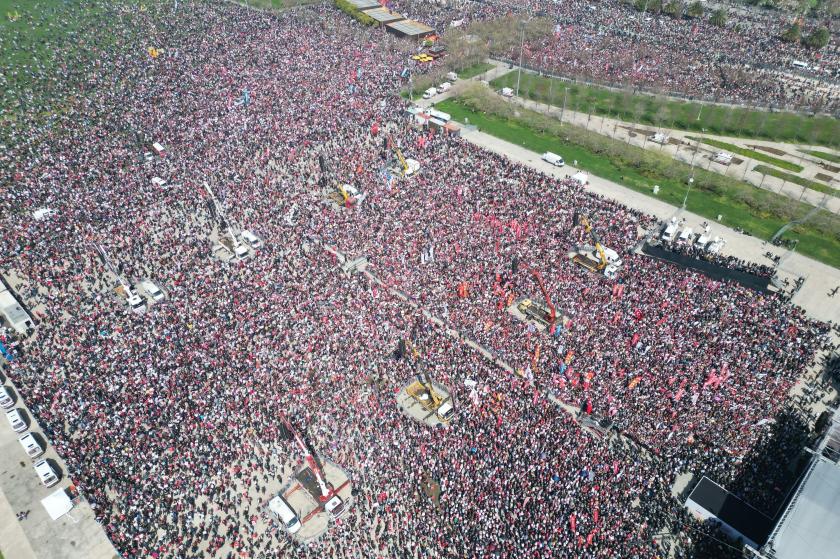The forces and calculations behind the HTS attack on Aleppo

Yusuf Karadaş

Fotoğraf: Kasim Rammah/AA
Clashes continue between the Syrian army and Hayat Tahir al-Sham (HTS), which launched a major attack on the city of Aleppo. It is reported that some groups affiliated to the Free Syrian Army/Syrian National Army (FSA/SNA), which is paid by the Erdoğan government, are also taking part in the HTS attack on Aleppo, the most strategic city in Syria after Damascus. The attack on Aleppo by HTS (formerly al-Nusra), which has held a significant part of the Syrian city of Idlib on the Syrian border with Turkey since 2015, is noteworthy because it coincides with a period in which, on the one hand, Israel's attacks and threats against Syria have increased and, on the other hand, the Erdoğan government is making efforts to re-establish political relations with the Syrian regime. Therefore, in order to understand the attack on Aleppo, it is necessary to look at what developments and forces are encouraging HTS and who is making what calculations through this attack.
Let us start with how the forces involved in the struggle for sovereignty in Syria view HTS.
It is well known that the Syrian regime, Russia and Iran consider HTS, the continuation of al-Qaeda's al-Nusra, to be a terrorist organisation. Although these powers are currently in a sort of compromise with the Erdogan government in Turkey in the 'Idlib de-escalation zone', they see Turkey's withdrawal of its military presence there and the cleansing of Idlib of HTS as a necessary condition for 'normalisation' in Syria.
As HTS is on the United Nations (UN) list of terrorist organisations, the Erdoğan government officially defines HTS as a terrorist organisation. However, it unofficially maintains relations with HTS through the National Intelligence Organisation of Turkey (MIT) and soldiers stationed at observation/control points in Idlib are used as a shield for HTS. The government of Turkey's approach to HTS is reflected in Erdoğan's statement in response to the Russian airstrike on Idlib: "What the Russians say: We are fighting terrorists... Who is a terrorist? Are those who defend their own country terrorists? They are resistance fighters.”
In 2022, HTS captured a significant part of Afrin with some FSA/SMO groups and then withdrew after the MIT intervened.
In 2013, Israel openly supported al-Nusra with air strikes during clashes between Hezbollah, which supports the Syrian regime, and al-Nusra over the capture of the strategic town of Quneitra on the Lebanese border. Israel sees and supports al-Nusra yesterday and HTS today as natural allies against the Syrian regime, pro-Iranian militias and Hezbollah.
US imperialism also sees HTS as a useful tool for its regional policy, although it officially recognises it as a terrorist organisation. The assessment of James Jeffrey, the then US special envoy to Syria, in 2020 is similar to Erdoğan's: "They are a direct extension of al-Qaeda, they are considered a terrorist organisation, but they are primarily focused on fighting the Assad regime. We have not yet accepted these claims, but they claim they are not terrorists but patriotic opposition fighters. We have not seen them as an international threat for some time.
The tacit support given to the al-Qaeda-linked HTS is a striking demonstration that US imperialism, which justifies its military presence in Syria with the 'fight against ISIS', has no criteria other than its own interests when dealing with jihadist gangs.
This is why Turkey and the US (and Israel) agree on Idlib, despite their disagreement over US cooperation with the Kurds in Rojava. The recent HTS attack on Aleppo, despite some nuances between them, also intersects significantly with the calculations of the government of Turkey, Israel and the US.
The fact that Russia has focused much of its attention and energy on Ukraine, China's reluctance to engage in open conflict, and Iran's difficulties and dilemmas in both domestic and foreign policy have made it easier for Israel to strike blows against Hamas and Hezbollah in Palestine and Lebanon. Then, the policy of using Israeli aggression as a means to reshape the region (breaking the Iranian-led axis of resistance and limiting Iran's influence) was continued in Syria with tanks on the Syrian border and air strikes against pro-Iranian militias.
This picture shows that the HTS is not only strengthened by the Israeli aggression, but also mobilised as an instrument of this policy of transformation.
At first glance, it may seem contradictory for Turkey to support HTS's attack on Aleppo while Erdogan is trying to open all doors to negotiate with Assad. However, it does not require deep analysis to see that the HTS attack on Aleppo is not independent of the Erdoğan government's knowledge and calculations in the region, from the control/observation points in Idlib to the relations established by MİT and the involvement of some of the Turkey-backed jihadist groups in this attack. Even the excitement of the pro-government media about the HTS attack on Aleppo is enough to understand the situation.
The Erdoğan government's calculations regarding this aggression are twofold:
The first is to ensure that Russia, which will not be a bystander to developments in Syria but is unable to mass its forces there, puts pressure on Assad to negotiate with Erdoğan. The second is to squeeze Assad over a strategic city like Aleppo and remove the condition of ending support for jihadist groups that he has put forward for talks with Erdoğan and the restoration of political relations.
Erdogan, Netanyahu and the US agree on using the HTS aggression as a means to weaken the regional power of the Syrian regime and its supporters. However, Erdoğan differs from the US and Israel in that he wants to use it to force Assad into political relations and cooperation, and to use this cooperation to destroy the Kurdish autonomous administration in Rojava.
The attack on Aleppo by al-Qaeda's successor, HTS, and the forces behind it, reveals who is protecting the jihadist terrorist organisations in the region and why. The re-emergence of HTS shows once again that there is no way to end the wars and conflicts in the region, to build a democratic future in which the peoples will live in peace, unless the attacks and occupations of the US imperialism and the regional reactionaries like the Erdoğan government and Israel are stopped and the jihadist gangs fuelled by these forces are liquidated.
The support given to HTS in one way or another and the uproar over the Aleppo attack also show how much the Erdoğan government, which today calls for "normalisation" with Syria, has actually learned the lessons of its destructive role in the Syrian war!




Follow Evrensel